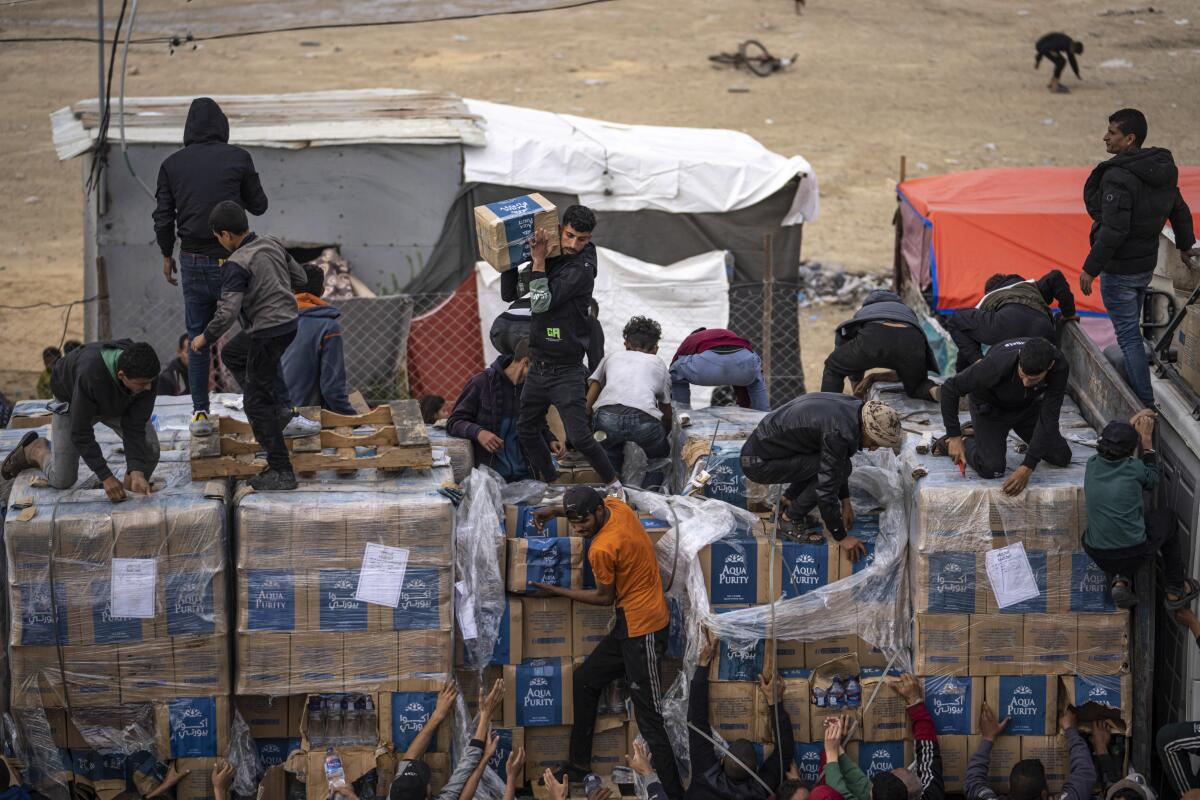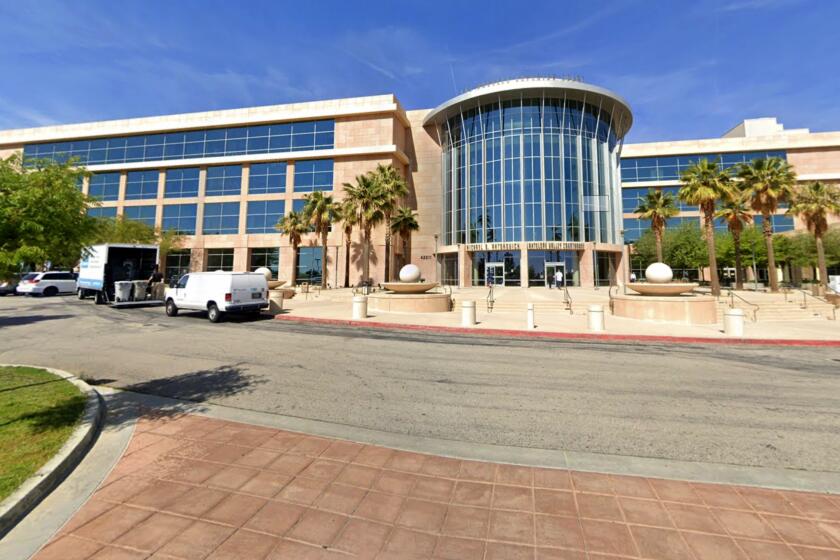Israel faces new calls for truce after killings of hostages raise alarm about war conduct

DEIR AL BALAH, Gaza Strip — Israel’s government faced calls for a cease-fire from some of its closest European allies on Sunday after a series of shootings, including the mistaken killings of three Israeli hostages, fueled global concerns about the conduct of the 10-week-old war in Gaza.
Israeli protesters are urging the government to renew hostage negotiations with the Gaza Strip’s Hamas rulers, whom it has vowed to destroy. The militant group triggered the war with its Oct. 7 attack in southern Israel, killing at least 1,200 people, mostly civilians, and kidnapping more than 240 Israelis and foreign nationals.
Israel could also face pressure to scale back major combat operations when U.S. Defense Secretary Lloyd J. Austin III visits Monday, as Washington has expressed growing unease with civilian casualties even while providing vital military and diplomatic support.
The war has flattened large parts of northern Gaza, killed thousands of civilians and driven most of the population to the southern part of the besieged territory, where many are packed into crowded shelters and tent camps. Some 1.9 million Palestinians — nearly 85% of Gaza’s population — have fled their homes.
They are surviving off a trickle of humanitarian aid.
Aid trucks driving in through the Rafah crossing with Egypt were surrounded by dozens of Palestinians, forcing some of the vehicles to stop, before they climbed aboard, pulling boxes down and carrying them off. Other trucks appeared to be guarded by masked people carrying sticks.
Israel said aid passed directly from Israel into Gaza for the first time Sunday, with 79 trucks crossing from Kerem Shalom, where about 500 trucks entered daily before the war. An additional 120 trucks entered via Rafah along with six trucks carrying fuel or cooking gas, said Wael abu Omar, Palestinian Crossings Authority spokesman.
Aid workers say it’s still far from enough. “You cannot deliver aid under a sky full of airstrikes,” a spokesperson with the United Nations’ agency for Palestinian refugees, Juliette Touma, said on social media. The agency estimated that more than 60% of Gaza’s infrastructure had been destroyed in the war.
Prime Minister Benjamin Netanyahu said Israel “will continue to fight until the end,” with the goal of eliminating Hamas, which has controlled the Palestinian territory since 2007.
A 4-year-old boy was killed Friday evening in Lancaster after a man shot into a family’s vehicle during a road rage incident, according to the Los Angeles Sheriff’s Department.
The Israeli military said Sunday that it had discovered a large tunnel in Gaza close to what was once a busy crossing into Israel.
Netanyahu has vowed to bring back the estimated 129 hostages still in captivity. Anger over the mistaken killings of hostages is likely to increase pressure on him to renew Qatar-mediated negotiations with Hamas over swapping more of the remaining captives for Palestinians imprisoned in Israel.
Israeli media reported that David Barnea, the head of Israel’s Mossad spy agency, met over the weekend with Qatar’s prime minister, Sheikh Mohammed bin Abdulrahman al Thani, who has mediated with Hamas, to discuss renewed talks.
Meanwhile, Israel has been defensively striking Hezbollah targets in Lebanon, said Rear Adm. Daniel Hagari, an Israel Defense Forces spokesperson. The group has ramped up attacks against Israel, he added, killing civilians and soldiers and displacing more than 80,000 Israelis from their homes.
“Hezbollah — a proxy of Iran — is dragging Lebanon into an unnecessary war that would have devastating consequences for the people of Lebanon,” Hagari said in a statement. “This is a war that they do not deserve.”
Hagari said Israel will continue to protect its borders “until and unless a diplomatic solution is found and implemented.”
Gaza, meanwhile, saw telecommunication services gradually resume after a four-day blackout, the longest of several outages during the war. Aid groups say they complicate rescue efforts and make it even more difficult to monitor the toll on civilians.
In Israel on Sunday, French Foreign Minister Catherine Colonna called for an “immediate truce” aimed at securing the release of more hostages, getting larger amounts of aid into Gaza and moving toward “the beginning of a political solution.”
France’s Foreign Ministry earlier said one of its employees was killed in an Israeli strike Wednesday on a home in Rafah. It condemned the strike, which it said had killed several civilians, and demanded clarification from Israeli authorities.
The foreign ministers of the U.K. and Germany, meanwhile, called for a “sustainable” cease-fire, saying “too many civilians have been killed.”
“Israel will not win this war if its operations destroy the prospect of peaceful co-existence with Palestinians,” British Foreign Secretary David Cameron and German Foreign Minister Annalena Baerbock wrote in the U.K.’s Sunday Times.
The U.S. Defense secretary is set to travel to Israel to continue discussions on a timetable for ending the war’s most intense phase. Israeli and U.S. officials have spoken of a transition to more targeted strikes aimed at killing Hamas leaders and rescuing hostages, without saying when it would occur.
Scores of protesters set up tents outside the Defense Ministry in Tel Aviv on Saturday, saying they would stay until the government resumed hostage negotiations with Hamas. “The hostages are experiencing hell and they are in mortal peril,” said Raz Ben-Ami, a hostage released in the last exchange. “Israel must offer another hostage-release deal.”
Hamas has said that no more hostages will be released until the war ends, and that in exchange it will demand the release of large numbers of Palestinian prisoners, including high-profile militants.
The militants freed over 100 of more than 240 hostages captured Oct. 7 in exchange for the release of scores of Palestinian prisoners during a brief cease-fire in November. Nearly all freed on both sides were women and minors. Israel has rescued one hostage.
Military officials said Saturday that the three hostages who were mistakenly shot by Israeli troops had tried to signal that they posed no harm. It was Israel’s first such acknowledgment of harming hostages in a war that it says is largely aimed at rescuing them.
The hostages, all in their 20s, were killed Friday in the Gaza City area of Shajaiya, where troops are engaged in fierce fighting with Hamas. An Israeli military official said the shootings were against the army’s rules of engagement and were being investigated at the highest level.
Israel says it makes every effort to avoid harming civilians and accuses the militant group of using them as human shields. Palestinians and rights groups have repeatedly accused Israeli forces of recklessly endangering civilians and firing on those who do not threaten them, both in Gaza and the occupied West Bank, which has seen a surge of violence since the start of the war.
Pope Francis on Sunday called for peace, saying “unarmed civilians are being bombed and shot at, and this has even happened inside the Holy Family parish complex, where there are no terrorists but families, children and sick people with disabilities, nuns.” He spoke after the Latin Patriarchate of Jerusalem said two Christian women at a church compound in Gaza were killed by Israeli sniper fire.
A British lawmaker, Layla Moran, said several family members were among hundreds sheltering in the compound. “This is a church. It’s a week before Christmas. This is Advent. This is an important time in the Christian family’s religious calendar. And there is a sniper killing women and firing at children,” she asserted.
In discussions Saturday between the Israeli military and representatives of the church community, no one reported a strike on the church or civilians being wounded or killed, the military said.
It said that a review of its initial investigation had supported that.
At least five Palestinians were killed during an Israeli raid in a built-up refugee camp in the West Bank town of Tulkarm, the Palestinian Authority Health Ministry said Sunday.
In Gaza, Palestinians on several occasions have said Israeli soldiers opened fire at fleeing civilians. Hamas has claimed other hostages were killed by Israeli fire or airstrikes, without presenting evidence.
The Israeli offensive has killed more than 18,700 Palestinians, the Health Ministry in the Hamas-run territory said Thursday. It has not been able to update the toll since then because of the communications blackout, and has said for weeks that thousands more casualties are buried under rubble.
The ministry does not differentiate between civilian and combatant deaths, but throughout the war it has said that most of those killed were women and children.
On Sunday, five people were killed and many injured after a reported Israeli airstrike hit near a U.N.-run school in the southern Gaza city of Khan Yunis where displaced Palestinians were sheltering. A cameraman with the Associated Press counted five bodies delivered to a hospital.
The plight of Palestinian civilians has received little attention in Israel, where many are still deeply traumatized by the Oct. 7 attack and where support for the war remains strong.
Israel’s military says 121 of its soldiers have been killed in the Gaza offensive. It says it has killed thousands of militants, without providing evidence.
More to Read
Sign up for Essential California
The most important California stories and recommendations in your inbox every morning.
You may occasionally receive promotional content from the Los Angeles Times.











